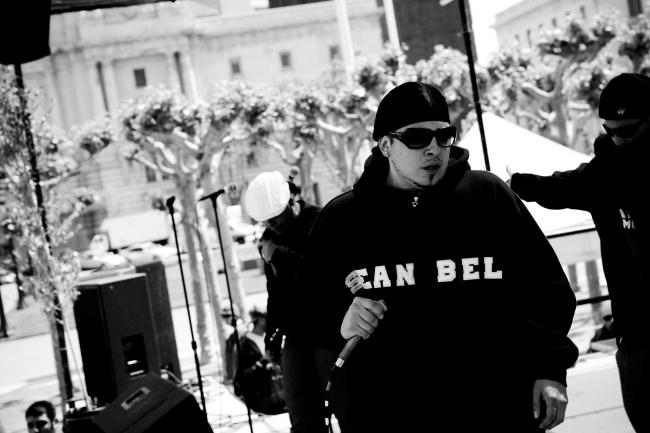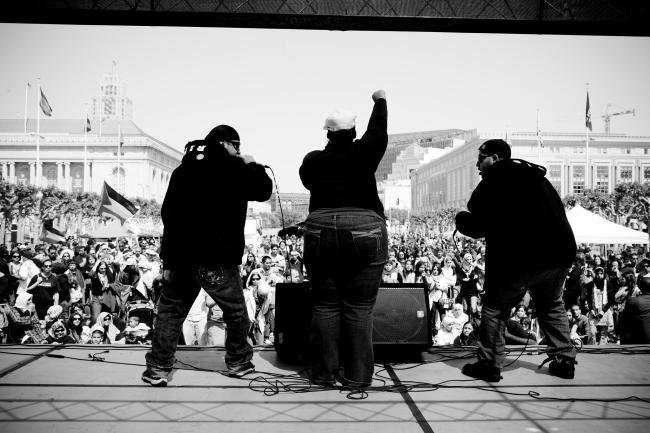
This is the third installment in a multi-part web series on solidarity movements between Latin America and Palestine. View the series here.
In a 41-second YouTube video, the legendary hip hop artist Method Man explains the origins of his cut, “P.L.O Style,” a reference to the Palestine Liberation Organization. In the early 1990s, Method Man frequented his neighborhood deli in Staten Island and studied the photos of children from Palestine's First Intifada that were taped to the walls. Facing down one of the most powerful armies in the world, the young children throwing rocks at tanks in those photos inspired the rapper. “They’ freedom fighters, and we felt like we were fightin’ for our freedom every day, too, where we lived at,” Method Man explains in the video, making connections between the systemic oppression of the Palestinian people and police brutality against Black communities in the United States.
Over the last 10 months, Israel has terrorized Gaza with a campaign of genocide and ethnic cleansing with the total support of the United States government. Life in the Gaza strip is an everyday struggle for survival in the face of mass murder, starvations, and displacement. As Palestinians continue to resist, global solidarity movements have grown. Built upon the revolutionary principle of Palestinian right to life and sovereignty, students, poets, and artists in New York and across the hemisphere have highlighted the connections between the ongoing Israeli violence against the Palestinian people and the leading cultural institutions.
Whether against police brutality or settler colonialism, the struggle for freedom has often found a medium in music and, especially, hip hop. Hip hop allows artists to express their grievances, desires, and embodied experiences with an anti-authoritarian posture and rejection of the trappings of respectability politics. Although it’s perceived as a North American tradition that has been globalized, one could argue that hip hop was always global. As Robin D.G. Kelley writes in The Vinyl Ain’t Final: Hip Hop and the Globalization of Black Popular Culture: “While the music, breakdancing, and graffiti writing that make up the components of hip hop culture are often associated with African-American urban youth, hip hop’s inventors also included the sons and daughters of immigrants who had been displaced by the movement of global capital.”
Diasporic musical traditions such as Caribbean soundsystem culture and Puerto Rican salsa influenced the formative years of hip hop, reflecting not only the diasporic nature of New York but also the new state of globalization during the 1970s. It is no coincidence that the birth year of hip hop coincides with the 1973 Arab-Israeli War, the U.S. defeat in Vietnam, the Irish Troubles, and the larger anti-colonial and anti-imperial movements of the Cold War era.
In the last 20 years, the defiant worldview of hip hop has broadened the horizon of resistance for Palestinians. Artists such as DAM, Muqata’a, Haykal, and Julmud use hip hop as a medium for dissent, articulating the political burden of their “citizenship” or lack thereof. In his book Everything but the Burden, Greg Tate argues that as white mainstream culture began to co-opt and commercialize Black culture—including hip hop’s musicality, dance, and style—it stole everything “but the burden.” The burden, of course, is state repression and the forces of Black resistance and political struggle against it. However, remaining true to the genre’s roots, artists from Palestine, Latin America, and across the Global South continue to use hip hop as a form of expression that recognizes that burden and actively resists repression.
Hip hop turned 50 last year. As the larger hip hop community has grown to maintain an ambivalent stance towards explicit political postures, especially around Palestine, some artists like Rodrigo Venegas, known as Rod Starz, of the hip hop duo Rebel Diaz, carry on the legacy of solidarity and political consciousness at the core of the genre. Solidarity can be viewed as a radical form of empathy, a willingness to not only see yourself in another's struggle, but to step out of yourself to be in struggle together.
Rebel Diaz has practiced this solidarity since their inception in 2006 through their militant New York lyricism. In their track “Whose Side Are You On?” the artists repeat the titular question only to chant back the radical geographies with which they are in solidarity. “Which side are you on? South Bronx! What side are you on? Oaxaca! Which side are you on? Palestina!” The call and response evokes a globalized political understanding and position, interconnecting the Indigenous struggles of Oaxaca, the violent gentrification of New York, the genocidal project in Palestine. Rebel Diaz has remained committed to their principles as cultural and political workers, boycotting performances when partnerships with Israeli organizations are at hand, attending direct actions, and leading performances for their political community.
In a series of zoom interviews and email exchanges in August, I asked Starz about his creative practice, political history, and views on Latin American solidarity with the Palestinian struggle for freedom and dignity in the face of the ongoing genocide. This interview has been edited for length and clarity.

Joyce Matos: When did your political analysis and organizing begin?
Rod Starz: My political analysis and organizing began before I was born. I’m a product of “the first 9/11,” September 11, 1973, when a CIA-funded military dictatorship overthrew the democratically elected socialist government of Salvador Allende. Both of my parents were college students at the time [in Chile] and were members of the Revolutionary Leftist Movement the MIR. Though critical of it, they supported the Popular Unity coalition that got Allende elected in 1970. My father was a political prisoner for more than three years, during which he was tortured by the DINA [National Intelligence Directorate], a School of the Americas-trained secret police force that violently imposed the authoritarian dictatorship of General Augusto Pinochet. I say this to show that I was essentially born into the struggle.
JM: How do you come to triangulate the political struggles of New York, Latin America, and Palestine?
RS: New York is the true melting pot of the globe. It starts in Wall Street and comes full circle with the people migrating to survive here from their home countries that capitalism has destroyed. The political struggles here are seen worldwide. NYC is the media capital of the world, and folks everywhere have their eyes on it. It was the students in New York who were the first to occupy their campus. It's all the young people here hitting the street that have inspired solidarity actions all across the United States and the world. Perhaps these are the streets that Subcomandante Marcos of the Zapatistas spoke of? Perhaps this is where the U.S. empire will fall? Who knows.
The pulse of Latin America is felt in New York, whether it is the Honduran and Venezuelan migrants that just arrived, or the displaced Puerto Ricans who are colonized like Palestine, or the Latino youth in the South Bronx who also live under occupation by way of the NYPD. NYC is also the homebase of powerful Zionist communities, so it is quite easy to make these worldwide connections.
JM: What are your reflections on the political uprising in the aftermath of October 7th?
RS: October 7th happened as a result of more than 70 years of occupation and land theft. Gaza has been under constant bombings and attacks. For Palestinians, it has been October 7th on their land every day since 1948. So understandably people who have lived with an Israeli boot on their necks are gonna respond to try and survive.
Hamas’s armed resistance can be viewed through this understanding. That’s why the whole “both sides” argument is bullshit. The Palestinian people have a right to resist, a right to exercise their right to exist. The response of Israel and the United States has been an all-out genocidal attack on every Palestinian. This has not been a war. It has not being fought on even grounds. This has been women, children, hospitals, and refugee camps being bombed with zero regard for human life, paid for by U.S. tax dollars!
So how are the Palestinian people not going to try and resist? The extreme violence has been broadcast to the world and people have spoken and responded globally in a way that the Zionist-controlled corporate media did not expect. It has also noticeably been the children of the elite—the Ivy League campuses of Columbia University, Harvard University, and Brown University, to name a few. This student intifada has inspired students all over the world to occupy their campuses in the name of a Free Palestine. Many of them have made the connections between the funding and endowments of their schools and the Zionist project and killing of Palestinians.
JM: Your organizing is interconnected to cultural production through your music. Is that the responsibility of artists operating in the United States to our comrades in Palestine and Latin America?
RS: My organizing is cultural. I organize through the lens of a cultural worker. It's my job as a cultural worker to make the ideas of revolution seem irresistible. To make the revolution lit, swaggy, exciting, safe, cool, healing, and fun.
To our comrades in Palestine, it is our responsibility to keep speaking up, keep speaking out. To use whatever platform we may have to address the Genocide going on in 4K. To say “Free Palestine” and be okay with it. To make this idea more mainstream. And we have seen that accomplished by this younger generation who are unapologetic about wanting to see Palestine free within their lifetime.
JM: How can we be a force of de-assimilation, not just supplying content but putting into question the whole thing?
RS: We can be a force of de-assimilation by not conceding the demands for a Free Palestine. By being students of history and sharing how this did not start on October 7th, 2023, but rather when Palestine was violently occupied in 1948 by the Zionists. This is about more than 70 years of occupation. It's also 70 years of resistance, and this is also a continuation of that.
The Democrats and Republicans have been unmasked for the violent warmongers they are. We have seen the desperate mafia-like attempts of powerful lobbies like AIPAC [a powerful pro-Israel lobbying group] to control the narrative. We have seen this pro-Palestine movement work so hard that I guarantee age wasn’t the only reason that “Genocide” Joe Biden was not electable again. They make us question the whole thing because the Zionists have shown us who they are, were, and always will be.
Joyce Matos is a political organizer from New York. She is currently studying at the Department of Modern Culture and Media at Brown University.

